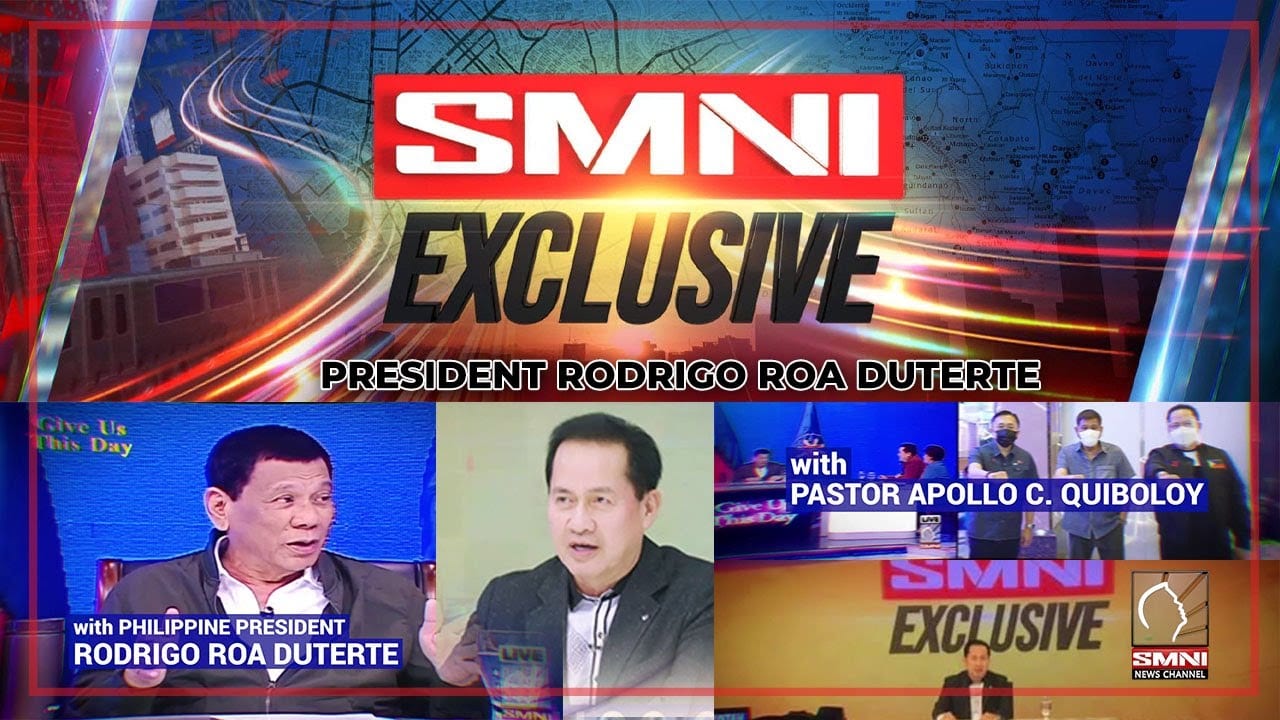PASTOR APOLLO C. QUIBOLOY ISSUES STATEMENTS ON ALLEGED CASES.
One-on-One Interview with the Head of State
[post-date]
Get a regular dose of blessings, inspiration and enlightenment by subscribing to Pastor ACQ’s website updates. Click here to subscribe →
[post-breadcrumb]
In an exclusive interview led by Pastor Apollo C. Quiboloy last June 8, 2021, President Rodrigo Roa Duterte answered relevant issues concerning the state of the country and discussed the challenges and achievements of the Duterte Administration as he nears the end of his six-year term.
Elected in 2016, President Rodrigo Duterte became the country’s first Mindanaoan President, winning a landslide victory of 16.6 million votes, the highest number of votes ever received by any Philippine president before him.
His 23-year stellar track record as Davao City’s local chief has translated into a nationwide scale as he remained true to his administration’s Zero to 10-Point Socioeconomic Agenda.
In October 2016, Duterte signed Executive Order No. 5 approving and adopting the National Long-Term Vision or Ambisyon Natin 2040 as the country’s blueprint for development planning.
When the Coronavirus pandemic hit the country, the Duterte Administration retrofitted its targets by updating its Philippine Development Plan 2017-2022 which is the country’s first medium-term plan geared towards the long-term vision.
The Philippines under Duterte’s Governance
Among the most notable policies, projects, and accomplishments of his administration are as follows:
- Independent Foreign Policy which strengthened relationships with existing and historic allies. While lessening the country’s dependence on the United States, it forged new allies and diplomatic engagements with non-traditional partners such as Russia, Japan, and India among others.
- Reforms and legislation that addressed the problems of criminality, corruption, violence, and drugs.
- Policies and reforms that paved the way to an inclusive and sustainable peace in the country — (a) the Bangsamoro Organic Law, (b) the Whole-of-Nation Approach to end insurgency and armed conflicts, among others. It is during Duterte’s term that we saw the gradual demise of entrenched impunity through the destruction of rebel groups and the dismantling of its factions. Almost 18,000 communist rebels and supporters surrendered to the government from July 2016 to May 2021.
- Government interventions that address poverty and hunger, boost employment, and help the different sectors of the economy.
- Laws that encourage innovation and the advancement of Science and Technology Education, Culture, and Sports.
- Improved Disaster Prevention and Risk Management programs to help the Local Government Units and their constituents in the event of national disasters and calamities.
- Programs and services for the welfare of Overseas Filipino Workers (OFW). The proposed Department of Overseas Filipinos is aimed at addressing all the needs and concerns of the migrant workers.
- Formation of the Inter-Agency Task Force (IATF) on Emerging and Infectious Diseases which is the prime mover of the government’s Coronavirus response. The Administration also provided assistance and benefits to the front-liners who are at the forefront of the unseen enemy in recognition of their hard work.
- Modernization of the Armed Forces of the Philippines (AFP), and
- The Duterte Administration’s flagship program — Build, Build, Build — infrastructure projects which ushered in the country’s “Golden Age of Infrastructure”. The Filipinos saw small and big infra projects being built and completed in cities, towns, and provinces across the country. In fact, the amount that the Duterte Administration poured into its Build, Build, Build program is more than double compared to any other previous administration. These infrastructure projects will play a key role in helping to kickstart the Philippine economy that has been marred by the pandemic.
The government has designated billions of dollars for the construction of big railway assets, airports, road and bridge projects across the nation to enhance mobility and connectivity in the Philippines.
The Department of Public Ways and Highways (DPWH) has already built and constructed at least 144,925 classrooms and 2,036 school workshop buildings, and other school facilities. It has also successfully constructed, maintained, widened, upgraded, and rehabilitated at least 26,494 kilometers of road across the country, and built at least 5,555 bridges. On top of these are other tourism roads, projects, and industries as well as trade corridors.
According to DPWH Secretary Mark Villar during an interview conducted by SMNI, “We are confident that most of the projects will be completed during the President’s term. This is the beauty of his administration. The planning is very good. The concept of Build, Build, Build which we are trying to achieve must be extended to all corners of the Philippines. This is really the vision of our President. We are doing our best to finish all the projects. There have been many challenges, the latest of which is COVID-19, but I’m happy to say that majority of our projects will be completed substantially.”
President Rodrigo Duterte’s administration has always been marked by heavy criticism. Despite the nitpicking of his so-called critics, Duterte continues to enjoy high trust and approval ratings, holding the highest public approval rating compared to the four previous Chief Executives of the Philippines.
Related Post: PRRD’s Exit Interview on SMNI Exclusive

